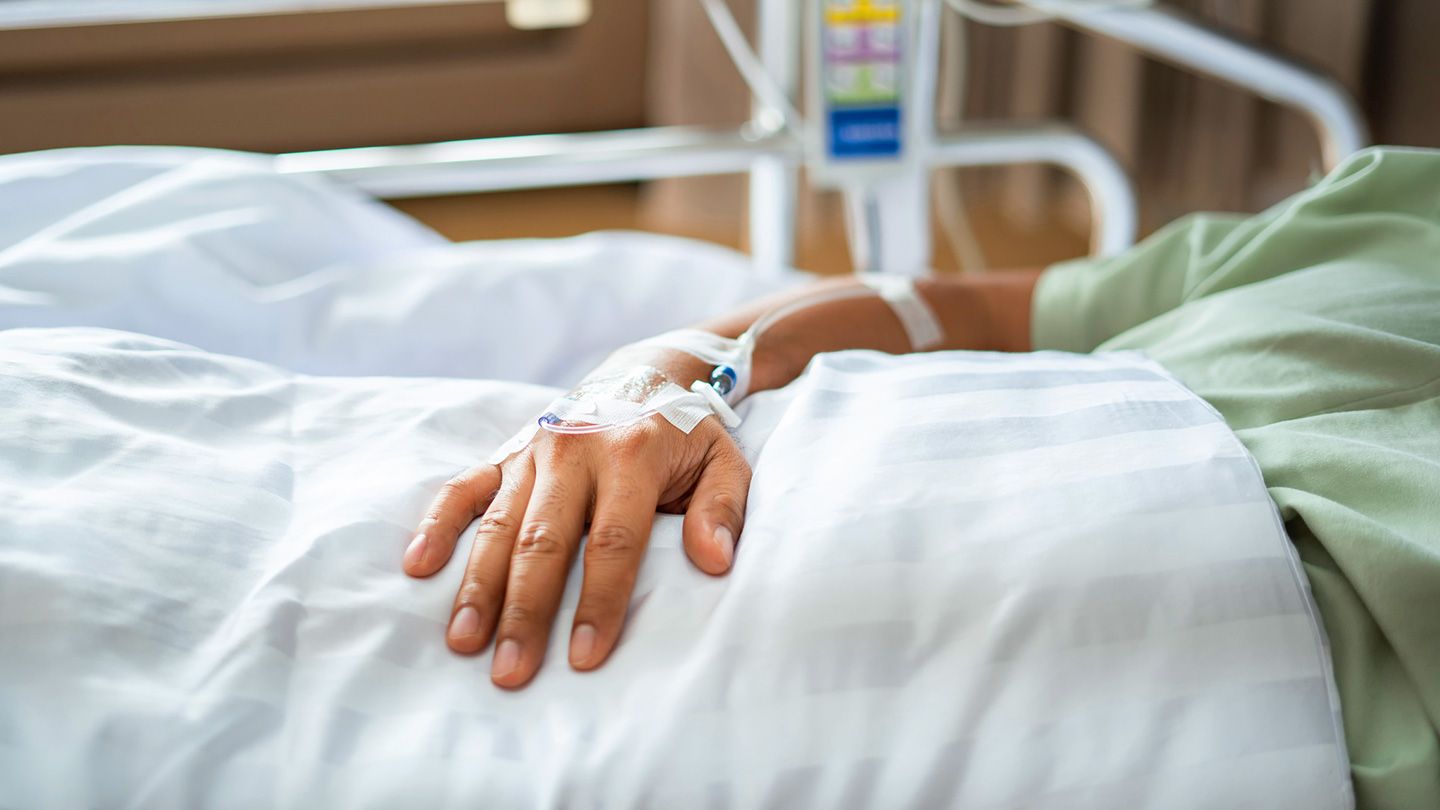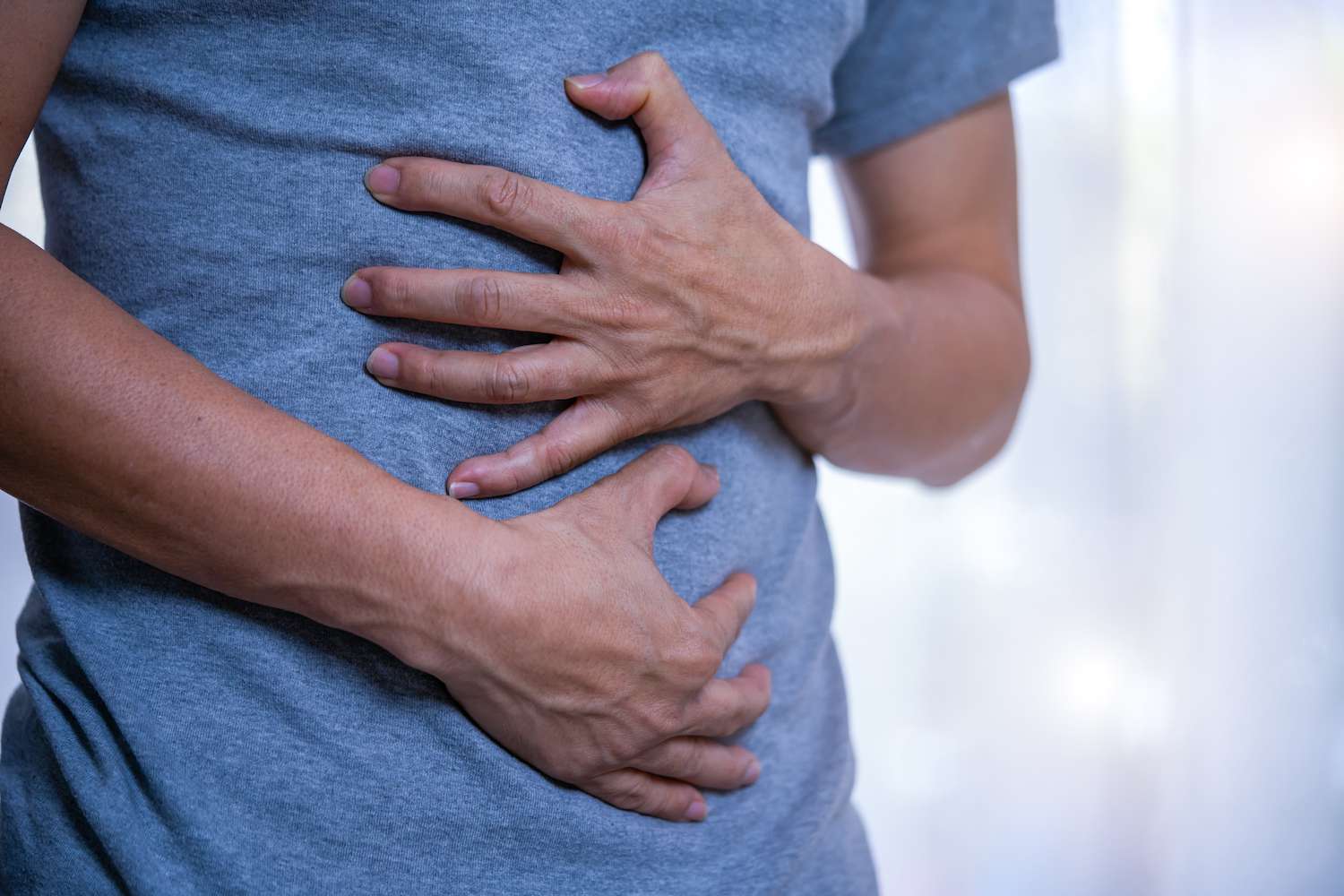Home>Latest Posts>Why Do You Need To Fart After Surgery


Latest Posts
Why Do You Need To Fart After Surgery
Modified: August 5, 2023
Learn why post-surgery flatulence occurs and the importance of managing it. Discover tips for reducing discomfort and promoting healing after a surgical procedure.
(Many of the links in this article redirect to a specific reviewed product. Your purchase of these products through affiliate links helps to generate commission for Under-tec.com, at no extra cost. Learn more)
Table of Contents
Introduction
Undergoing surgery can be a daunting and life-altering experience. Whether it’s a minor outpatient procedure or a major operation, the body goes through significant changes during and after surgery. One common and unexpected occurrence that many individuals experience post-surgery is the need to pass gas, or in simpler terms, the urge to fart.
While it may seem like an awkward and inconvenient topic to discuss, understanding why this happens is crucial in order to alleviate discomfort and aid in the recovery process. Post-surgery gas is a natural and common side effect for many patients, and it’s important to know why it occurs and how to manage it effectively.
When we think of gas, we often associate it with the digestive process and dietary factors. However, post-surgery gas is not solely caused by what we eat. The act of surgery itself can lead to an accumulation of gas in the body, primarily in the abdominal region. This build-up of gas can cause discomfort, bloating, and even pain.
There are several reasons why excess gas accumulates after surgery. First, during surgery, the body is often placed in different positions, such as being tilted or even upside down. These positions can obstruct the natural flow of gas through the digestive system, leading to a build-up of trapped gas.
Secondly, anesthesia administered during surgery can have a slowing effect on the digestive system, causing a decrease in movement known as peristalsis. Peristalsis is the wave-like contractions that help propel food and gas through the intestines. When peristalsis is slowed, gas can become trapped, resulting in discomfort.
Furthermore, surgical procedures may involve the inflation of the abdomen with carbon dioxide gas. This is done to create space and provide better visibility for the surgeon. While the gas is usually removed at the end of the surgery, residual amounts can remain in the body, contributing to post-operative gas.
The effects of trapped gas on the body can be uncomfortable and even painful. Common symptoms include bloating, abdominal distension, belching, and a sensation of fullness. In some cases, trapped gas can also cause referred pain, leading to discomfort in other areas of the body, such as the shoulder.
The good news is there are strategies to relieve post-operative gas and minimize its impact on the recovery process. From simple lifestyle modifications to medication options, there is a range of solutions available to help alleviate discomfort and promote healing.
In the following sections, we will explore the causes of excess gas after surgery, the effects of trapped gas on the body, and various strategies to relieve post-operative gas. By understanding and implementing these strategies, individuals can navigate the post-surgery period with greater comfort and ease.
Understanding post-surgery gas
Post-surgery gas is a common occurrence that many individuals experience after undergoing a surgical procedure. It refers to the build-up of gas in the digestive system, primarily in the abdominal region, which can result in discomfort, bloating, and even pain.
During surgery, the body may be manipulated and positioned in ways that disrupt the natural flow of gas through the digestive system. These positions, such as being tilted or upside down, can obstruct the movement of gas and lead to its accumulation.
Anesthesia, which is administered during surgery to induce unconsciousness and control pain, can also impact the digestive system. It can slow down the normal contractions of the intestines known as peristalsis. When peristalsis is slowed, the movement of gas through the digestive tract is hindered, resulting in gas build-up.
In addition to these factors, some surgical procedures involve the inflation of the abdomen with carbon dioxide gas. This is done to create space and improve visibility for the surgeon. While the gas is typically removed at the end of the surgery, small amounts may remain trapped in the body, contributing to post-operative gas.
It’s important to note that post-surgery gas is a natural and expected outcome of surgical procedures. It is not indicative of any complications or underlying health issues. Understanding the causes of this gas build-up can help individuals navigate their recovery journey with greater ease and comfort.
Trapped gas can have various effects on the body. One common symptom is bloating, which is characterized by a feeling of fullness and tightness in the abdomen. The abdomen may appear distended or swollen due to the accumulation of gas.
In addition to bloating, individuals may experience increased belching and flatulence as the body tries to release the trapped gas. This can be both embarrassing and uncomfortable, but it is a natural mechanism for relieving the build-up of gas.
In some cases, trapped gas can also cause referred pain, which is discomfort felt in an area unrelated to the site of origin. This is known as shoulder pain, and it occurs when gas irritates the diaphragm, a muscle separating the chest and abdominal cavities. The pain is usually temporary but can be quite uncomfortable.
By understanding the mechanisms behind post-surgery gas, individuals can take proactive steps to manage and alleviate the discomfort. In the next section, we will explore various strategies to relieve post-operative gas and promote a smoother recovery process.
Causes of excess gas after surgery
Experiencing excess gas after surgery is a common phenomenon that can be attributed to several factors. Understanding the underlying causes can help individuals better manage and relieve post-operative gas discomfort.
The first factor contributing to excess gas is the manipulation of the body during surgery. Surgeons often need to reposition organs or tissues to access and perform surgical procedures effectively. These movements can disrupt the normal flow of gas through the digestive system, leading to its accumulation and subsequent discomfort.
Anesthesia, a necessary component of most surgical procedures, can also play a role in the development of post-operative gas. Anesthetics can slow down the contractions of the intestines, referred to as peristalsis, which help propel food and gas through the digestive tract. When peristalsis is slowed, gas can build up, causing bloating and discomfort.
Another cause of excess gas after surgery is the use of carbon dioxide gas to inflate the abdomen during certain procedures. This technique, known as insufflation, creates space and improves visibility for the surgical team. However, residual gas may remain trapped in the body after the surgery, contributing to post-operative gas.
Dietary factors also play a role in the development of excess gas after surgery. When the digestive system is still recovering from the effects of surgery, certain foods can be more difficult to digest, leading to increased gas production. Foods high in fiber, such as beans, lentils, and cruciferous vegetables like broccoli and cabbage, are known to cause gas buildup.
In addition to dietary factors, individuals may also experience an imbalance in the gut microbiome after surgery. The gut microbiome refers to the community of bacteria and other microorganisms residing in the digestive tract. Surgery, especially when accompanied by the use of antibiotics, can disrupt this delicate balance and contribute to increased gas production and discomfort.
Last but not least, stress and anxiety can also exacerbate the symptoms of excess gas after surgery. The body’s response to stress can influence digestion and lead to an increase in gas production. Therefore, managing stress levels and implementing relaxation techniques can play a role in reducing post-operative gas discomfort.
It’s important to note that while excess gas after surgery is a common occurrence, some individuals may experience more significant gas buildup or prolonged discomfort. In such cases, it is advisable to consult with a healthcare professional to rule out any complications or underlying health issues.
In the next section, we will explore the effects of trapped gas on the body and discuss various strategies to relieve and manage post-operative gas.
Effects of trapped gas on the body
Trapped gas in the body, particularly after surgery, can have a range of effects that can be uncomfortable and even painful. Understanding these effects is essential for individuals to seek appropriate relief and manage post-operative gas effectively.
One of the most common symptoms of trapped gas is bloating. This is characterized by a feeling of fullness and tightness in the abdomen. The abdomen may appear distended or swollen due to the accumulation of gas. Bloating can be uncomfortable and may make it difficult to fit into clothing or perform daily activities comfortably.
Another effect of trapped gas is increased belching and flatulence. As the body tries to release the trapped gas, individuals may experience more frequent burping and passing of gas. While this can be embarrassing for some, it is a natural mechanism to alleviate the discomfort caused by gas buildup.
Additionally, trapped gas can commonly cause referred pain, particularly in the shoulder area. This is known as shoulder pain, and it occurs when the gas irritates the diaphragm, the muscle that separates the chest and abdominal cavities. The pain may be sharp and fleeting, but it can be quite uncomfortable.
In some cases, individuals may experience discomfort or an increased urgency to pass gas when lying down or changing body positions. This is due to the gas being released from the trapped areas in the digestive system as body positioning changes. This discomfort can disrupt sleep and overall well-being.
Moreover, trapped gas can also cause general discomfort and a feeling of unease. The build-up of gas can create pressure in the abdomen, leading to an overall sensation of discomfort or even pain. This discomfort can affect daily activities and hinder the recovery process.
It’s important to recognize that the effects of trapped gas on the body can vary from individual to individual. Factors such as the type of surgery, the duration of gas build-up, and the person’s overall health condition can impact the severity and duration of symptoms.
While these effects are temporary and typically resolve on their own as the body naturally passes the trapped gas, there are strategies and treatments available to alleviate discomfort and promote the release of gas. In the next section, we will explore various strategies, including medications and diet modifications, to relieve post-operative gas.
Strategies to relieve post-operative gas
Experiencing discomfort from post-operative gas can be frustrating, but there are effective strategies that can help alleviate the symptoms and promote relief. Implementing these strategies can aid in the recovery process and improve overall comfort. Here are some strategies to consider:
- Moving and walking: Engaging in light physical activity such as walking can stimulate the digestive system and facilitate the release of trapped gas. Movement helps to improve peristalsis, which is the wave-like contractions that move food and gas through the intestines.
- Gentle abdominal massage: Massaging the abdomen in a gentle circular motion can help stimulate the movement of gas and provide relief. It is important to be gentle and not apply excessive pressure, especially if the surgical site is still healing.
- Applying heat: Placing a heating pad or warm towel on the abdomen can help relax the muscles and relieve gas-related discomfort. Heat therapy promotes blood flow, which can aid in the movement of gas through the digestive system.
- Probiotics: Taking probiotic supplements or consuming foods rich in probiotics can help restore the balance of good bacteria in the gut. This can aid in digestion and reduce gas production. Yogurt, kefir, sauerkraut, and kimchi are examples of probiotic-rich foods.
- Activated charcoal: Activated charcoal is known for its ability to absorb excess gas in the digestive system. Taking activated charcoal capsules or tablets may help reduce bloating and discomfort. However, it is essential to consult with a healthcare professional before using activated charcoal, especially if other medications are being taken.
- Simethicone: Simethicone is an over-the-counter medication that helps break down gas bubbles in the digestive tract, making them easier to pass. It can provide quick relief from gas-related symptoms. However, it is advisable to consult with a healthcare professional before using any medication, especially if there are underlying medical conditions or other medications being taken.
- Modifying eating habits: Making changes to the diet can help reduce post-operative gas. Avoiding carbonated beverages, chewing food thoroughly, and avoiding foods known to cause gas, such as beans, lentils, broccoli, and cabbage, can minimize gas production.
- Slowly reintroducing solid foods: After surgery, the digestive system may need time to re-adjust. Starting with easily digestible foods and gradually reintroducing solid foods can prevent excessive gas production and aid in the recovery process.
It’s important to note that not all strategies may work for everyone, and it may require some trial and error to find what works best. Furthermore, it is advisable to consult with a healthcare professional before implementing any strategies or taking any medications, especially for individuals with underlying health conditions or who are taking other medications.
By adopting these strategies, individuals can effectively manage and relieve post-operative gas discomfort, promoting a smoother and more comfortable recovery process.
Medications for managing post-surgery gas
When it comes to managing post-surgery gas, there are various medications available that can provide relief and help alleviate discomfort. These medications can target different mechanisms that contribute to excessive gas production and can be used alongside other strategies to manage post-operative gas.
Simethicone: Simethicone is an over-the-counter medication commonly used to manage gas-related symptoms. It works by breaking down gas bubbles in the digestive tract, making them easier to pass. Simethicone is available in various forms, including tablets, capsules, and liquids. It is generally safe and well-tolerated, but it is important to follow the recommended dosage and consult with a healthcare professional before use, especially if there are underlying medical conditions or other medications being taken.
Activated charcoal: Activated charcoal is another option for managing post-surgery gas. It is known for its ability to absorb excess gas in the digestive system. Activated charcoal is available in the form of capsules or tablets and works by binding to gas molecules, reducing bloating and discomfort. However, it is important to consult with a healthcare professional before using activated charcoal, especially if there are underlying health conditions or if other medications are being taken, as it may interfere with their absorption.
Prokinetics: Prokinetic medications can help stimulate the movement of food and gas through the digestive system, reducing the build-up of trapped gas. These medications work by enhancing the contractions of the intestines, known as peristalsis. Prokinetic medications are available by prescription and should be used under the guidance of a healthcare professional, as they may have potential side effects and interactions with other medications.
Antacids: In some cases, post-surgery gas may be accompanied by acid reflux or heartburn, which can exacerbate discomfort. Antacids can help neutralize stomach acid and provide relief from these symptoms. Antacids are available over the counter and can come in liquid or tablet form. It is important to follow the recommended dosage and consult with a healthcare professional if symptoms persist or worsen.
It is important to note that while medications can provide relief, they should be used in conjunction with other strategies such as lifestyle modifications and dietary changes. Additionally, it is crucial to consult with a healthcare professional before starting any medication, especially if there are underlying health conditions or if other medications are being taken.
Everyone’s body reacts differently to medications, and what works for one person may not work for another. Therefore, it is important to work closely with a healthcare professional to determine the most appropriate medication and dosage for managing post-surgery gas.
In the next section, we will explore diet modifications that can help reduce post-operative gas and promote a smoother recovery process.
Diet modifications to reduce post-operative gas
Making dietary changes can play a significant role in reducing post-operative gas and promoting a smoother recovery process. Certain food choices and eating habits can help minimize gas production and alleviate discomfort. Here are some diet modifications to consider:
- Gradual transition: After surgery, the digestive system may need time to recover. Start with easily digestible foods such as clear liquids, broths, and pureed foods. Gradually introduce solid foods as tolerated, allowing the system to adjust and reducing the likelihood of excessive gas production.
- Chew food thoroughly: Properly chewing food can aid in digestion and reduce the amount of air swallowed, which can contribute to gas formation. Take the time to chew each bite thoroughly before swallowing.
- Avoid carbonated beverages: Carbonated drinks can introduce additional gas into the digestive system, leading to discomfort. It is best to avoid or minimize consumption of carbonated beverages during the post-operative period.
- Limit gas-producing foods: Some foods are known to produce more gas, and reducing their intake can help alleviate post-surgery gas symptoms. Examples include beans, lentils, broccoli, cabbage, onions, and carbonated drinks. Monitor your body’s response to specific foods and tailor your diet accordingly.
- Be mindful of fiber intake: Fiber is an important part of a healthy diet, but it can contribute to increased gas production. Gradually increase fiber intake to avoid sudden changes that may lead to excessive gas. Opt for soluble fiber sources like oats, apples, and carrots, which are typically gentler on the digestive system.
- Avoid straws and excessive chewing gum: Using straws or chewing gum can introduce excess air into the digestive system, leading to gas. Minimize their use to reduce the likelihood of gas formation.
- Stay hydrated: Drinking enough fluids, especially water, can help maintain proper digestion and prevent constipation, which can contribute to gas buildup. Aim to drink an adequate amount of fluids throughout the day.
- Consider dietary enzymes: Digestive enzymes can help improve digestion and reduce gas production. Consult with a healthcare professional to determine if supplemental digestive enzymes are appropriate for you.
It’s important to listen to your body and pay attention to how certain foods and eating habits affect your post-operative gas symptoms. Everyone’s tolerance to specific foods can vary, so it’s important to identify and limit or avoid triggers that worsen gas discomfort.
Keep in mind that while dietary modifications can be helpful in reducing gas, they should be implemented alongside other strategies, such as medication or lifestyle changes, for optimal relief. If you have any concerns or questions regarding your post-operative diet, consult with a healthcare professional or a registered dietitian.
In the next section, we will discuss when it is appropriate to seek medical attention for post-operative gas symptoms.
When to seek medical attention
While post-operative gas is a common occurrence and typically resolves on its own, there are instances when it is appropriate to seek medical attention. It’s important to be aware of warning signs or symptoms that may indicate a need for further evaluation or treatment. Here are some situations when medical attention is warranted:
- Severe or prolonged pain: If you are experiencing intense or persistent abdominal pain that is not relieved with over-the-counter pain medications, it is important to seek medical attention. This may indicate a complication related to the surgery or another underlying issue that requires prompt evaluation.
- Excessive bloating: While bloating is a common symptom of post-operative gas, if it becomes severe or is associated with other concerning symptoms such as severe abdominal distension, difficulty breathing, or chest pain, it is important to seek medical attention. These could be signs of a more serious condition.
- High fever or signs of infection: If you develop a high fever, chills, redness, warmth, or discharge from the surgical site, it may indicate an infection. Infections after surgery can be serious and require immediate medical attention.
- Inability to pass gas or have bowel movements: If you are unable to pass gas or have a bowel movement for an extended period after surgery, it may indicate a blockage in the intestines. This can lead to severe abdominal pain, nausea, vomiting, and requires urgent medical evaluation.
- Worsening symptoms or new-onset symptoms: If your symptoms are worsening over time or you develop new-onset symptoms such as vomiting, significant weight loss, or changes in bowel habits, it is important to consult with a healthcare professional to rule out any underlying complications or issues.
It’s important to trust your instincts and seek medical attention if you are concerned or unsure about any symptoms you are experiencing. Remember, timely medical intervention can help identify and address any potential complications or underlying conditions.
Keep in mind that this list is not exhaustive, and if you have any other concerns or questions about your post-operative recovery, it is always best to consult with your surgeon or healthcare provider. They can provide individualized guidance and tailor their recommendations to your specific situation.
In the final section, we will summarize the key points discussed and wrap up the article.
Conclusion
Post-operative gas is a common occurrence that many individuals experience after undergoing surgery. It can cause discomfort, bloating, and even pain as a result of gas accumulation in the digestive system. Understanding the causes of post-surgery gas and its effects on the body is crucial for managing and relieving these symptoms effectively.
Various strategies can be employed to alleviate post-operative gas, including lifestyle modifications, medications, and dietary changes. Simple actions such as moving and walking, gentle abdominal massage, and applying heat can help stimulate the movement of gas and provide relief. Medications such as simethicone and activated charcoal can aid in breaking down gas bubbles and reducing bloating. Additionally, modifying the diet by avoiding gas-producing foods and gradually reintroducing solid foods can minimize gas production and discomfort.
While these strategies can be effective for most individuals, it is important to recognize when medical attention is necessary. Severe or prolonged pain, excessive bloating, signs of infection, inability to pass gas or have bowel movements, and worsening or new-onset symptoms should prompt immediate medical evaluation.
Overall, managing post-operative gas is essential for promoting a smoother recovery process and improving comfort. By understanding the causes, effects, and strategies for relief, individuals can navigate the post-surgery period with greater ease and peace of mind. If you have any concerns or questions about your post-operative gas symptoms, it is always advisable to consult with your healthcare professional for personalized guidance.
Remember, every individual’s recovery is unique, and what works for one person may not work for another. Be patient with your body as it heals, and take the necessary steps to promote healing and comfort in your post-operative journey.










